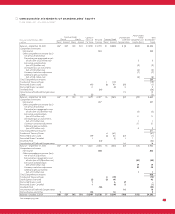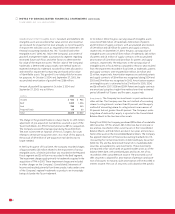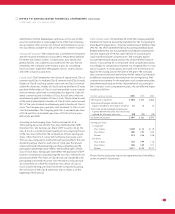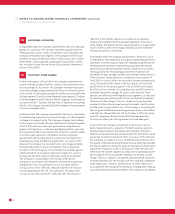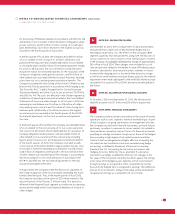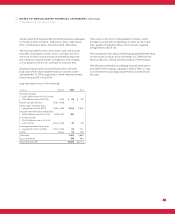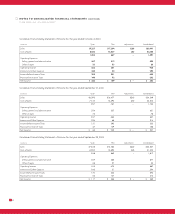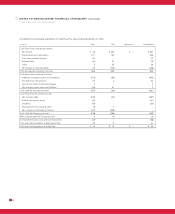Tyson Foods 2004 Annual Report Download - page 40
Download and view the complete annual report
Please find page 40 of the 2004 Tyson Foods annual report below. You can navigate through the pages in the report by either clicking on the pages listed below, or by using the keyword search tool below to find specific information within the annual report.
38
NOTES TO CONSOLIDATED FINANCIAL STATEMENTS (CONTINUED)
NOTE THREE : DISPOSITION
In September 2002, the Company completed the sale of its Specialty
Brands, Inc. subsidiary. The subsidiary had been acquired with the
TFM acquisition, and its results of operations were included in the
Company’s Prepared Foods segment. The Company received cash
proceeds of approximately $131 million, which were used to reduce
indebtedness, and recognized a pretax gain of $22 million, which
was included in other income on the Consolidated Statement of
Income of fiscal 2002.
NOTE FOUR : OTHER CHARGES
In the fourth quarter of fiscal 2004, the Company implemented a
control whereby all plant facilities conduct fixed asset inventories
on a recurring basis. As a result, the Company recorded fixed asset
write-down charges of approximately $21 million in the fourth quarter
of fiscal 2004, of which approximately $13 million was recorded in the
Chicken segment, $5 million in the Prepared Foods segment, $2 million
in the Beef segment and $1 million in the Pork segment. Additionally, as
discussed in Note 1, “Business and Summary of Significant Accounting
Policies,” the Company recorded $25 million related to the impairment
of various intangible assets.
In February 2004, the Company announced its decision to consolidate
its manufacturing operations in Jackson, Mississippi, into the Company’s
Carthage, Mississippi, facility. The Company acquired the Carthage
facility when it purchased Choctaw Maid Farms in the fourth quarter
of fiscal 2003 and, since that time, performed a comprehensive
analysis of all operations in the area and determined this consolida-
tion would most effectively maintain the Company’s competitiveness
in its Mississippi operations. The Jackson location employed
approximately 800 people and was a poultry processing facility,
including processing and deboning operations. As a result of this
decision, the Company has recorded total costs of approximately
$9 million ($8 million in the second quarter of fiscal 2004 and
$1 million in the third quarter of fiscal 2004) that includes approxi-
mately $8 million of estimated impairment charges for assets to
be disposed of and $1 million of employee termination benefits.
The Company is accounting for the closing of the Jackson
operation in accordance with Statement of Financial Accounting
Standards No. 146, “Accounting for Costs Associated with Exit
or Disposal Activities” (SFAS No. 146) and Statement of Financial
Accounting Standards No. 144, “Accounting for the Impairment
or Disposal of Long-Lived Assets” (SFAS No. 144). This amount is
reflected in the Chicken segment as a reduction of operating
income and included in the Consolidated Statements of Income in
other charges. The Jackson location ceased operations in August 2004.
As of October 2, 2004, the Company had fully paid its estimated
termination benefits of $1 million.
In December 2003, the Company announced its decision to close
its Manchester, New Hampshire, and Augusta, Maine, Prepared Foods
operations to further improve long-term manufacturing efficiencies.
The Manchester operation employed approximately 550 people
and primarily produced sandwich meat for foodservice customers.
The Augusta facility employed approximately 170 people and
produced hot dogs, sausages, boneless hams and deli turkey products.
These locations ceased operations during the second quarter of
fiscal 2004. As a result of this decision, the Company recorded total
costs of $24 million ($21 million in the first quarter of fiscal 2004
and $3 million in the second quarter of fiscal 2004) that included
$4 million of costs related to closing the plants and $20 million of
estimated impairment charges for assets to be disposed. These
amounts are reflected in the Prepared Foods segment as a reduction
of operating income and included in the Consolidated Statements
of Income in other charges. The costs related to closing the plants
include $2 million of employee termination benefits and $2 million
of other plant closing related costs. The Company is accounting for
the closing of the Manchester and Augusta operations in accordance
with SFAS No. 146 and SFAS No. 144. At October 2, 2004, $2 million
related to employee termination benefits had been paid and
$2 million of other plant closing related costs had been paid.
In April 2003, the Company announced its decision to close its
Berlin, Maryland, poultry operation. The Berlin poultry operation
employed approximately 650 people and included a hatchery, a
feed mill, live production and a processing facility. The facility ceased
processing chickens November 12, 2003. As a result of this decision,
the Company recorded total costs of $29 million ($4 million in the
first quarter of fiscal 2004 and $25 million in fiscal 2003) that included
$14 million related to closing the plant and $15 million of estimated
impairment charges for assets to be disposed. These amounts are
reflected in the Chicken segment as a reduction of operating income
and included in the Consolidated Statements of Income in other
charges. The costs related to closing the plant include $9 million for
estimated liabilities for the resolution of the Company’s obligations
under 209 grower contracts, and $5 million of other related costs
associated with the closing of the operation, including plant clean-up
costs and employee termination benefits. The Company is accounting





